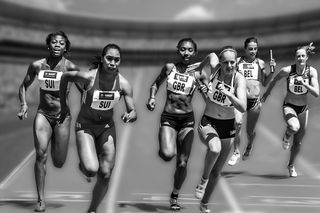
Sport and Competition
Sports Psychology: Mind and Body
Sports psychology emphasizes the mind and body for athletic success.
Posted January 1, 2017 Reviewed by Ekua Hagan

Over the years, an increasing number of students have asked me about becoming a sports psychologist. Students understand that our society loves sports, and (for better or worse) this love of sports means there is a need for psychologists to help those involved in athletics.
With the above in mind, you should first understand that sports psychology is really an interdisciplinary science. Besides psychology, it is also concerned with disciplines such as biomechanics, physiology, and kinesiology. As a definition, the American Psychological Association’s Division 47 (Society of Sport, Exercise, and Performance Psychology) states the following:
Sport Psychology addresses the interactions between psychology and sport performance, including the psychological aspects of optimal athletic performance, the psychological care and well-being of athletes, coaches, and sport organizations, and the connection between physical and psychological functioning.
Based on this definition, sports psychologists can participate in various activities, mostly focused on working to understand what motivates athletes and how athletes can improve their performance. These activities can range from counseling athletes who might have anxiety issues that hamper their performance to instructing athletes (individually or in groups) on methods of mental conditioning (e.g., visualization, concentration, and relaxation) to helping athletes deal with injuries.
To put all of this in another way, a sport psychologist is working from the perspective that success in sports relies on both the body and mind. To add one other important point, sports psychologists are often found working with elite athletes—Olympians and professionals. However, sports psychologists can be found working with athletes at all levels as well as with coaches and sports administrators.
All of the above may really appeal to you, but then the question is, how do you become a sports psychologist? It all begins with an undergraduate degree. This degree is typically in Psychology. However, there are an increasing number of colleges that offer an undergraduate Sports Psychology major — check out the Association for Applied Sports Psychology for information. This major combines courses in Psychology with those in Physical Education/Kinesiology. Finally, if you want to become a sports psychologist, it is possible to start with a degree in Physical Education/Kinesiology.
It would be nice if you could use your undergraduate degree and get a job as a sports psychologist, but this is simply not the case. Most individuals who want a career in sports psychology must earn an advanced degree. This advanced degree can be from a designated Sports Psychology Master’s or doctoral program. It may also be the case that you can earn your graduate degree in a clinical or counseling doctoral program, and then take additional classes in kinesiology, physiology, sports medicine, business and marketing. Remember that a Master’s degree can take two to three years and completing your doctoral degree may take as long as six years.
There are a few other important points to make about getting a graduate degree in sports psychology or a related Psychology area. First, every graduate program has unique requirements. Before you jump into applying to a program, make sure you have done your homework and thoroughly checked out the program.
Second, if you plan on getting a doctoral degree it is likely the case that you will be required to complete a one-year internship where you will get additional training in an applied setting. For more info about a graduate degree in sports psychology click here.
Third, it is always to your benefit to stick with graduate programs that are accredited by the American Psychological Association. For example, certain jobs require that you were trained at an accredited school.
Fourth, it is to your benefit to be certified as a sports psychologist by the Association for Applied Sport Psychology.
Fifth, if you complete a counseling or clinical program you will almost surely apply for licensure. You will need to meet your state’s educational and training requirements and passed a comprehensive exam. Being licensed is very important, not only to be able to work with clients and be employed in various position, but also because only when you are licensed can you legally call yourself a “psychologist”.
Upon receiving your graduate degree, you will see there are a lot of options for you as far as jobs. These include being a faculty member at university where you would teach and conduct research. You could work at a hospital, physical rehabilitation center, or gym. There are job possibilities with the military, given their concern with keeping troops mentally fit for battle.
Finally, you might decide to open your own practice, where you can work with individual athletes and/or teams. Your private practice might even lead to working with individuals you might not typically think of as athletes. This could include dancers or even those in the business world who may be dealing with high-pressure jobs. As far as what you will earn in a job, collegeatlas.com lists the mean salary for a sports psychologist at $57,000. However, I have seen higher estimates elsewhere.
I hope this information helps you think about another career option related to Psychology. Good luck!
Please note that the comments of Dr. Golding and the others who post on this blog express their own opinion and not that of the University of Kentucky.
Want More?
Check out our website for helpful information on pursuing a psychology-related career, visit Dr. Golding's blog to get advice on how to succeed in college, and find us on Instagram, Facebook, and Twitter.



